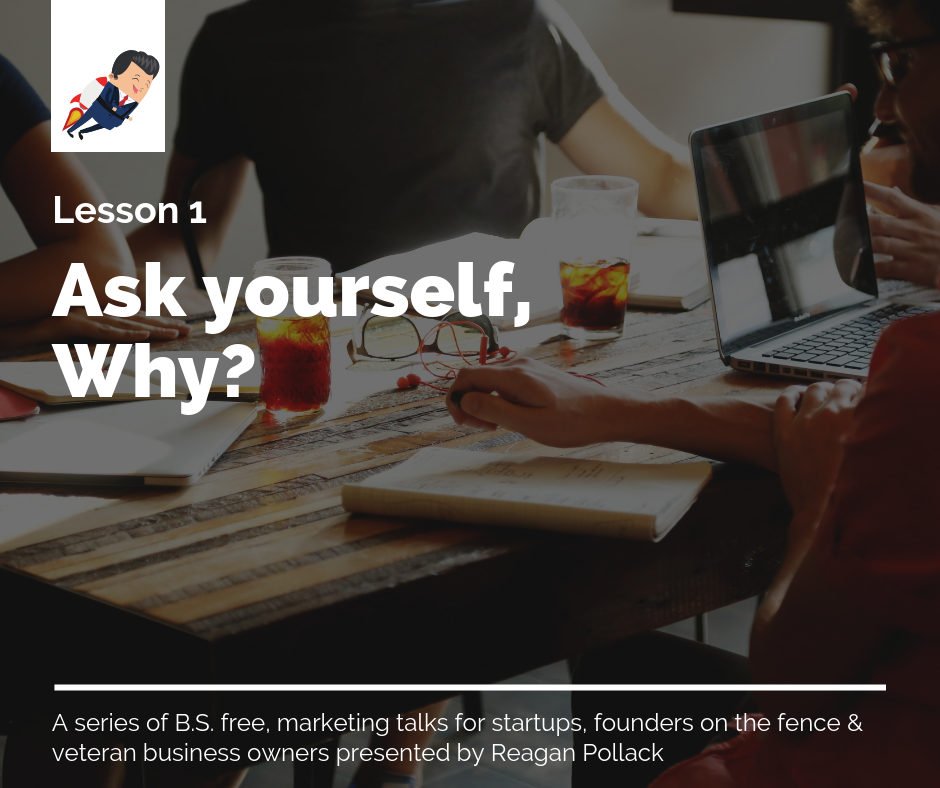
Ask yourself, why?
Lesson 1: Ask yourself, why?
You know, before we dive head first into the latest startup scaling strategies, financial tools and marketing mumbo jumbo, we’ve got to address the big elephant in the room — you.
Entrepreneurs, by definition, are a different breed. They think differently (often against the suggestions of others to conform to cubicle mediocrity), and moreover, they take the leap of faith to act on their impulses backed by data. While many view entrepreneurs as risk lovers, the truth is, they’re risk averse. “But, aren’t startups really risky Reagan?” Yes, you’re right, but only because the probabilities are historically not in your favor to succeed financially.
1 out of every 5 startups (20%) fail within the first 12 months, and 50% fail within the following 5 years (according to the National Entrepreneurship Report by the Global Entrepreneurship Monitor, GEM).
The good entrepreneurs reduce risk in their startups from the beginning, by thinking backwards from successful outcome in reverse to today — not the other way around.
When done correctly, we end up fast-forwarding two years out to visualize what ‘success’ looks like, and then back to today (and I put success in quotes because it means totally different things to different people).
After seeing what success may look like in the future — the product, the value for users (or customers), the number of employees working beside us, the pace of our business, the amount of freedom we now have two years out from inception, our personal salaries, etc. — we can then see clearly why we’re starting in the first place.
Asking ourselves ‘Why’ before we begin, helps us to galvanize our intention as to why we care so damn much about the creation of this one particular product, service or experience and sharing it with the world.
When we fail to ask why, and be brutally honest with ourselves as to why we want to start something or be a part of a startup, then we’ve already lost the underlying meaning of it all.
It’s okay to say, “I want to own my own business so I don’t have to report to a crappy boss anymore”, or “I want to own my own business so I can make a six figure salary instead of always working for less than what I am really worth”, or “I want to finally have the freedom to take a week or two off and have other people support my vacation as I haven’t rewarded my family with downtime in years” – these are all acceptable reasons, but I want you to start with why (as Simon Sinek would say in his book Find Your Why), and be honest with yourself.
I can’t give you your why, only you can.
And frankly, the why doesn’t have to be the same as your company’s mission statement to change the world one app download at a time or whatever BS it is that you intend to sell — that’s hyperbole that’s designed to guide your team and provide a North Star on a continuous basis.
I need you to be honest with yourself first about what’s really driving you to run your own shop, to spend the next two or four years building something that people need but don’t know they need just yet. If this thing doesn’t take off the way you hope it might today, will you still be okay with the personal purpose as to why you tried?
This is your homework for this week — put the market analysis, the problem, the new widget, the financial and marketing strategies aside, and get to the root of entrepreneurship — Why you? Why now? Why this?
******************
#startups #entrepreneurship #entreprenuer #founder #SMB #smallbusiness #realtalk #tuesdaymotivation #tuesdaythoughts


Recent Comments